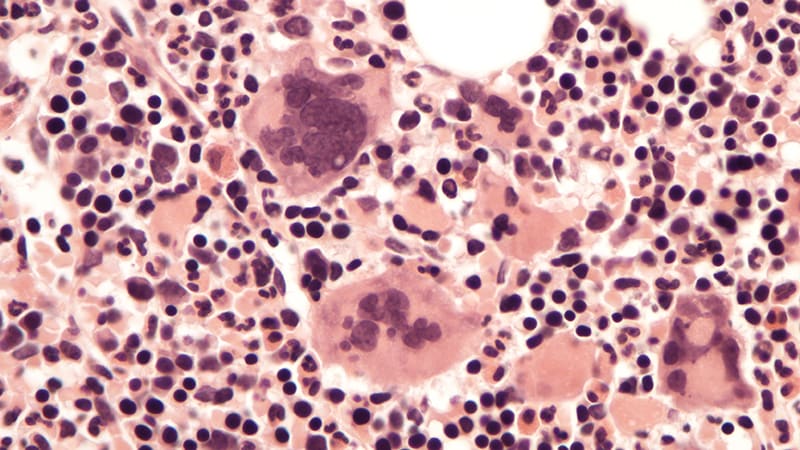InnovationRx: Trump's Proposed Budget Slashes Biomedical Research
In this week’s edition of InnovationRx, we look at the impact of Trump’s proposed budget cuts on biomedical research and global health, news from the ASCO cancer meeting, Summit Therapeutics’ Maky Zanganeh and more. To get it in your inbox, subscribe here.
Getty Images
, released on Friday, slashes spending for research on diseases and global health. If enacted, it would set back the effort to find cures for cancer, Alzheimer’s and other diseases and lead to increased deaths and disability worldwide.
It would cut the Department of Health and Human Services by about 25%. Within the HHS, the National Institutes of Health faces an even harder hit with a proposed 40% budget cut threatening research on cancer and other diseases. Under the proposed budget, the agency would also consolidate its institutes from 27 to just eight, mostly by combining several institutes and centers into larger departments. An opinion in JAMA called cuts to the NIH “an $8 trillion health care catastrophe” due to its impact on life expectancy and lost health.
Public health is also on the chopping block. The CDC faces a 54% budget cut. Part of those cuts reflect a plan to move some of its work on chronic diseases to a newly formed HHS agency called “Administration for a Healthy America.” The Trump budget proposal also calls for slashing support for global public health initiatives, such as the President’s Emergency Plan for AIDS Relief, a longstanding effort to combat AIDS and HIV, by more than 60%.
These proposed cuts would be piled on top of several other major changes that HHS has made to curtail ongoing research. Last week, for example, the Administration terminated a $258 million program aimed at developing a vaccine for HIV, the virus that causes AIDS. Research in this program has also been useful in developing treatments for other conditions, such as snakebites and COVID-19.
Last month, the NIH also adopted a new policy banning “foreign subawards” – meaning that money from NIH grants can’t be used to support international scientists who are collaborating with the grant recipient. As a consequence, Nature reported, “funding will abruptly cease for dozens, if not hundreds, of ongoing trials of experimental drugs and treatments.”
Trump’s proposed budget is not law, but rather a detailed wish list of the White House’s policies. It is up to Congress to determine the federal budget, and lawmakers are only now beginning the annual process to do so.
getty
B presented the latest clinical trial data for drugs aimed at combatting the toughest cancers at the American Society for Clinical Oncology annual conference in Chicago. Here are some of the highlights.
reported that its drug Enhertu, co-developed with Daiichi Sankyo, reduced disease progression or death by 44% when used in combination with the monoclonal antibody pertuzumab for patients with metastatic breast cancer. Patients in the trial survived a median of three years with progression-free disease, the first improvement on a first-line therapy for breast cancer in more than a decade.
The company also said that its drug camizestrant, in combination with another family of cancer drugs, reduced the risk of death or disease progression by 56% compared to the current standard of care. This trial was the first to monitor DNA from the tumors with a blood test, rather than with images, to determine whether to change treatment. The ability to do this is “redefining how breast cancer is treated and followed up,” AstraZeneca oncology head Susan Galbraith told Forbes.
reported that 33% of blood cancer patients who received its CAR-T therapy, Carvykti, showed no progression in their cancer over five years after a single infusion of the treatment. The patients in the study had already received other forms of cancer treatment before getting Carvykti.
said that a high number of mesothelioma patients (a rare and aggressive form of cancer) receiving its drug BNT-327 in a clinical trial responded to the medication, with more than half of the 31 patients seeing their tumors shrink by more than 30%. The Germany-based biotech is exploring use of the drug in a number of tough cancers. It announced on Monday that it agreed to jointly develop and commercialize BNT327 with Bristol Myers Squibb in a deal that could be worth more than $11 billion.
presented new analysis from clinical trials of its prostate cancer drug Nubeqa, finding that the drug improved patient quality of life compared to a placebo. That result followed previous data showing that it reduced risk of disease progression or death by 46% in combination with the current standard of care. On Tuesday, the FDA approved Nubeqa for certain prostate cancer patients.
Massachusetts-based biotech reported that its small molecule drug candidate, zipalertinib, which targets lung cancer patients with a genetic mutation that prevents common therapies from working, had a 35% response rate. The patients’ cancers had already metastasized, but the median progression-free survival rate was more than nine months.
About 10% of patients have these mutations, chief medical officer Jeff Jones told Forbes, who said Cullinan is looking to test the drug in broader patient populations as well. The drug, taken as a pill, also had fewer side effects than comparable cancer treatments, he said, making a course of treatment less likely to be discontinued.
Pharmaceutical ingredient manufacturer Antheia raised $56 million led by Global Health Investment Corp. at an undisclosed valuation. Cofounder and CEO Christina Smolke told Forbes she hopes to use the funds to expand the company’s production of thebaine, a key component of common pain medications. Antheia makes the ingredient using fermentation–similar to the way beer is produced–as opposed to conventional methods, where thebaine is extracted from crops.
The Menlo Park, Calif.-based company plans to produce other new products, including oripavine, also used in pain medications, and scopolamine, an ingredient in medications for nausea, vomiting and motion sickness. The fermentation technology allows facilities to be built where they’re needed, Smolke said. “That is going to allow us to rebuild our supply chain and solve issues of resiliency,” she said.
AI adoption is accelerating among nurses as they become more comfortable with its use, according to a newly released survey by Incredible Health. Only 38% of nurses now fear AI will hurt their jobs, down from nearly two-thirds last year. Meanwhile 85% of nurses say they want more training on how to use AI in their jobs.
Plus: The FDA announced it has begun using AI tools in its internal processes, but NBC News reports that they struggle to perform simple tasks.
The Department of Health and Human Services cancelled a contract with Moderna valued at up to $760 million for its development of an mRNA vaccine against potential pandemic viruses, such as avian flu, which is currently circulating in livestock in the United States. The company said that initial clinical trials showed the vaccine candidate was both safe and effective. Moderna said it was exploring options to continue the vaccine’s development. HHS Communications Director Andrew Nixon called mRNA technology “under-tested” in a statement provided to Forbes. “We are not going to spend taxpayer dollars repeating the mistakes of the last administration, which concealed legitimate safety concerns from the public.”
Amesh Adalja, a senior scholar at the Johns Hopkins Center for Health Security, told Forbes that Nixon’s comments were “complete misinformation,” and that mRNA vaccines are an important tool in combatting an infectious disease emergency because of how quickly they can be developed and manufactured. “You need to have something that’s going to be fast,” he said.
Forbes profiled Maky Zanganeh, Summit Therapeutics co-CEO, Iranian immigrant and cancer survivor, as part of the America’s Richest Self-Made Women list.
The Trump Administration has paused appointments for new student visas as it comes up with a plan to review applicant’s social media accounts. That means hundreds of newly-minted M.D.’s may not be able to start their residencies.
The budget bill that passed the House of Representatives makes significant changes to Medicaid that could result in 7 million people losing their health insurance.
The Trump Administration ordered VA doctors and scientists not to publish in journals without first seeking clearance from political appointees, the latest effort to restrict federal researchers’ publications.
Startup Vivodyne raises $40 million to expand the development of its lab-grown human tissues for use in drug discovery as the FDA and NIH push back on animal testing. (Read our 2023 profile of the company here.)
Sanofi plans buy Cambridge, Mass.-based biotech Blueprint Medicines for $9.1 billion in a bid to bolster its rare immunology pipeline.
New drug delivery technologies, now undergoing clinical testing, can move medicine to the brain, which may enable better treatments for Alzheimer’s and other diseases.
The FDA has approved Moderna’s new Covid vaccine for adults over 65 and those older than 12 with risk factors. HHS Secretary Robert F. Kennedy Jr., a vaccine critic, has pushed for new restrictions on vaccine eligibility and approval. Young, healthy adults would not be eligible for the new vaccine, despite their inclusion in Moderna’s clinical trials.
Stat profiled DOGE’s Brad Smith, the healthcare entrepreneur behind $67 billion in spending cuts.
ForbesPension Funds Have Had It With Tesla’s Board And MuskForbesThe Unlikely Path From Iranian Revolution To Billionaire Biotech CEOBy Kerry A. DolanForbesAmerica’s Richest Women Celebrities 2025By Matt Craig









